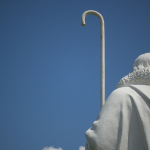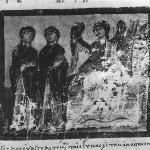A recent inquiry was made to me from a friend as to why I disagreed with a certain political philosophy. The discussion became a heated argument which we both later regretted. Apologies were made on both sides. Yet, the question remains. I will rephrase it here in my own terminology.
Why do I remain a traditional protestant and a democratic socialist? The answer is simple. I do not believe in perfect circles of any type. Let see if I can unpack that answer.
The Western intellectual heritage help for many years that perfect examples of everyday things existed. If they could not be found on earth then they surely existed in the heavens. The stars, the planets, and the sun were made of a perfect substance called quintessence. Every right thinking person knew this to be true. Only renegades like Anaxagoras or Zeno thought differently. Aristotle thought the elements all moved to their natural sphere. Ptolemy and much later Copernicus agreed that the motions of the heavens were governed by perfect circles. If the observed behaviors of the planets did not conform to perfect circles then other circles were invented to show the planets orbited twice (the second time in their own orbits) to explain the observation. The only real difference in these models of the Universe were the relative positions of the Sun and Earth. It was not until the time of Galileo, Brahe, and Kepler that other explanations were even considered possible. Yet, the elegance of perfect circles and perfect systems continued to hold sway in the minds of the Western peoples. Consider that today we use words such as quintessential to represent the best example of a type. We consider mathematical reasoning to be more organic, logical, and rational than information derived from observation and experimentation. Changes in action and thought are said to be revolutionary. Something basic is elementary. Thomas Kuhn’s use of the word paradigm still haunts us in the twenty-first century.
These terms I have just described are indeed as much the ghosts in our thinking as they are the spirits of the age. And they are behind all areas of our thought whether those thoughts are scientific, educational, political, economic, theological, or philosophical. The problems we think we face are based on the realization that the circles are not perfect enough. The ghosts then become demons to our minds. And we then fight them in ways that lead to social madness. The perfect state becomes a goal to build the perfect society. We can reasonably demonstrate that all people must do is adopt a perfectly rational idea and all things will work to the good. Yet, this cannot be perfected so then the perfect ideal society is no state at all. The perfect morality becomes a godless society. Religion is poison so truly liberated people become ethical through seeing to their own intellectual and spiritual self-interest. Or perfect morality is based on perfect theology to please the deity and every other area of thought must bend to that. Perfect knowledge leads to perfect action and people must be forced to have perfect knowledge and so forth. These quests for perfection deny a reality. They deny what is really before our eyes. And this intellectual madness becomes the destruction of very real persons, animals, and institutions.
The only solution is to admit, in all honesty, that the circle cannot and should not be closed. As a traditional protestant studying the varied methods and histories of theology, religious, devotional, and spiritual practice the supposed purity of our system is never achieved. We must admit the tragedy of desiring the perfect Christian system is an ongoing experiment. If building the kingdom of heaven on earth is our goal, which I believe it is, then loving God and our neighbor is where we begin using the greatest of the theological virtues to support our faith and hope. Being a democratic socialist means taking civil liberties seriously. The United States encodes and often expands the codes of these liberties based on what we learn through trial and error. Other Western nations can draw their own liberties through the hundreds of years of trial and error living in traditions. The socialist side is to recognize the human and environmental costs of industrialization and does not externalize these costs in order to look nice on charted calculations. Adaptation is therefore constant in all areas of life. And hopefully justice if not loving-kindness may be achieved.














